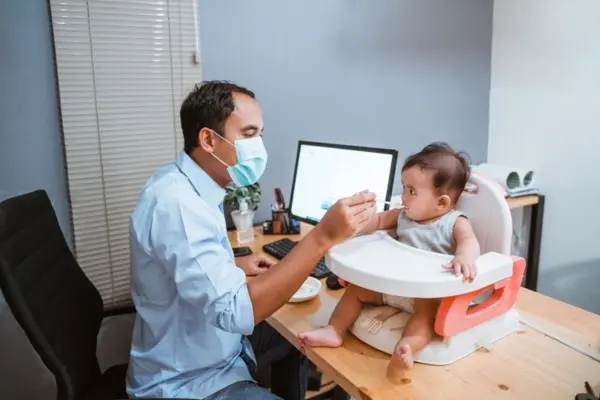Welcoming a newborn into your life is an exciting and overwhelming experience. If you’re a first-time parent, you may feel unsure about how to care for your tiny baby. Don’t worry! This beginner’s manual will guide you through the essential things you need to know to take care of your newborn in the first few weeks.
1. Feeding Your Newborn

In the early days, your baby will need to feed frequently, usually every 2-3 hours. Newborns either breastfeed or take formula, depending on what you choose.
- Breastfeeding: If you are breastfeeding, make sure your baby latches on properly to prevent pain and ensure they get enough milk. Breast milk provides the best nutrition for your baby in the first few months.
- Formula Feeding: If you choose formula feeding, make sure to follow the instructions on the package and prepare the formula safely. Always sterilize the bottles and nipples before use.
Remember, feeding your baby should be a calm and comfortable experience. Hold your baby close, cuddle them, and enjoy this bonding time.
2. Diapering Your Baby

Newborns usually need their diapers changed around 10-12 times a day. Be prepared for a lot of diaper changes! Here's how to do it properly:
- Lay your baby on a clean, safe surface (like a changing table or a soft mat).
- Gently remove the dirty diaper and wipe your baby clean using baby wipes or a damp cloth.
- Make sure to clean your baby’s diaper area well to prevent diaper rash.
- Put on a clean diaper, making sure it’s snug but not too tight.
Always wash your hands after changing a diaper to maintain hygiene.
3. Bathing Your Newborn

Newborns don’t need a full bath every day. Instead, give them a sponge bath until their umbilical cord stump falls off, usually within the first 2 weeks.
- Use lukewarm water and a soft washcloth to clean your baby.
- Focus on cleaning the face, neck, and diaper area gently.
- Be careful around the umbilical cord stump to avoid infection.
- After the bath, gently dry your baby with a soft towel.
As your baby grows, you can begin giving them regular baths in a baby bathtub.
4. Sleeping Habits

Newborns sleep a lot—about 16-17 hours a day, but usually in short stretches. They wake up every 2-3 hours to eat.
- Always place your baby on their back to sleep, which reduces the risk of Sudden Infant Death Syndrome (SIDS).
- Use a firm mattress in the crib, with no pillows, blankets, or stuffed animals, to ensure safe sleeping.
- Keep the room at a comfortable temperature (not too hot or cold) and avoid overheating.
Make sure your baby has a calm and safe environment for sleeping, and try to establish a bedtime routine.
5. Caring for Your Baby's Skin

Newborns have sensitive skin, so it’s important to take good care of it. Use gentle, baby-friendly products like mild soap and lotions.
- Avoid using harsh chemicals or strong fragrances on your baby’s skin.
- Keep your baby’s skin moisturized, especially in dry weather.
- Watch out for diaper rash. If you notice redness, apply a diaper rash cream to help soothe the skin.
If your baby develops a rash or any other skin condition, it’s a good idea to consult your pediatrician.
6. Bonding with Your Baby

Bonding is an important part of early childhood development. Spending time with your baby, talking to them, and making eye contact helps create a strong emotional connection.
- Talk or sing to your baby, even if they can’t understand you yet. Your voice is soothing to them.
- Hold your baby close and provide comfort when they cry. This helps your baby feel secure.
Remember, bonding is not only good for your baby, but it’s also great for you as a parent. It builds trust and love.
7. When to Call the Doctor

While caring for your newborn, you may have concerns. Always contact your pediatrician if:
- Your baby has a fever (above 100.4°F or 38°C).
- Your baby seems to be feeding poorly or has trouble breathing.
- You notice any unusual symptoms like jaundice, rashes, or persistent crying.
It's always better to ask a doctor if you're unsure about something.
Conclusion
Taking care of a newborn can be challenging, but it’s also a wonderful journey. By following these basic guidelines, you’ll be able to give your baby the care and love they need during these early days. Be patient with yourself and your baby. Trust your instincts, and don’t hesitate to reach out for help when needed. Your newborn is lucky to have you as their caregiver!